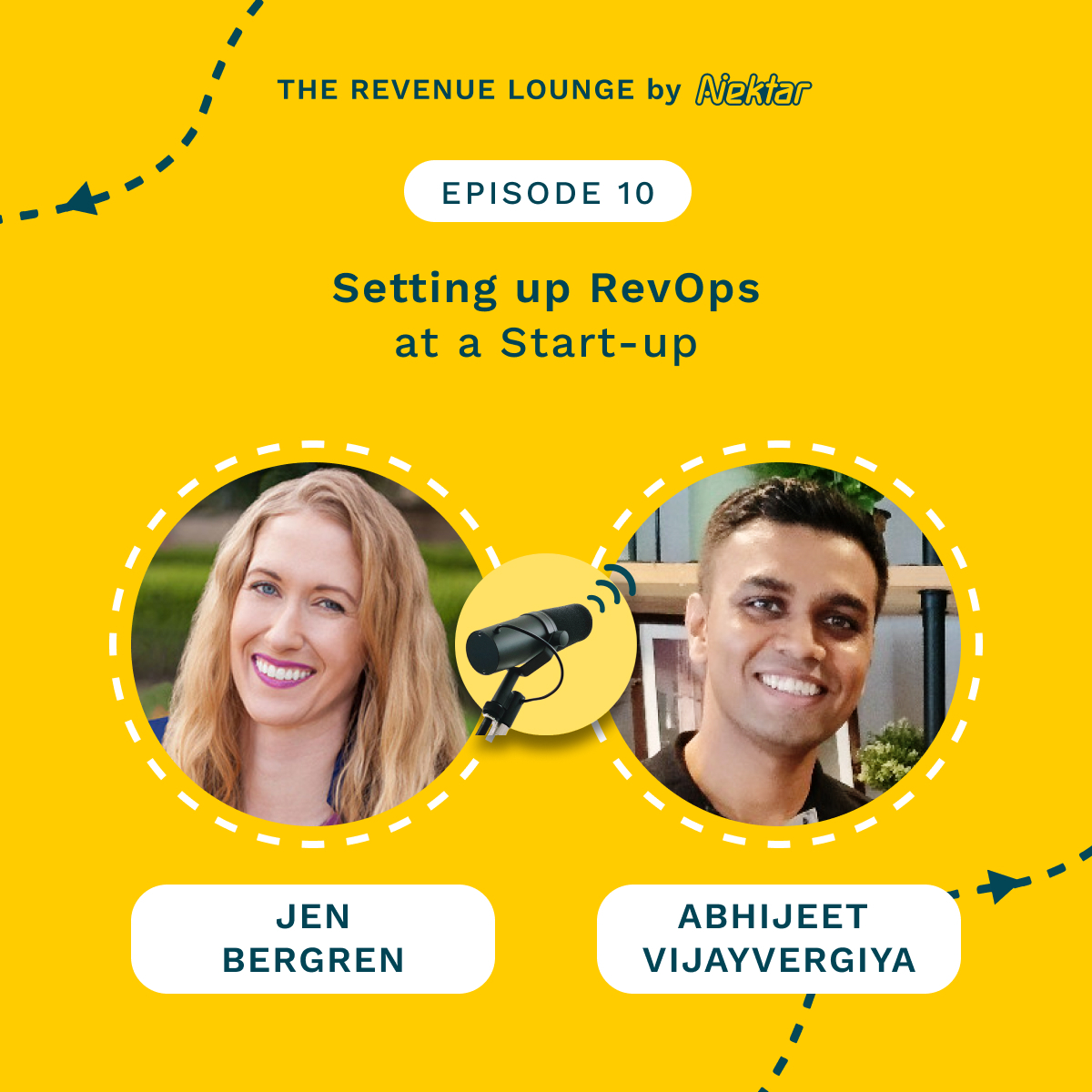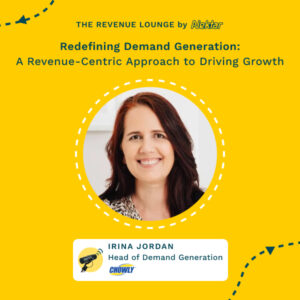How RevOps Can Partner With Sales to Drive Forecasting Accuracy ft. Kevin Mulrane
March 20, 2024
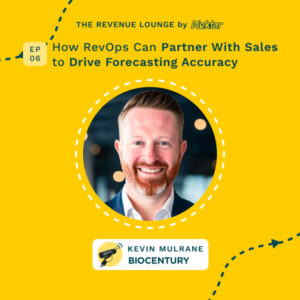
About
The Revenue Lounge
The podcast covers stories from leaders across RevOps, Sales, Customer Success, GTM, Data and Marketing about what drives these functions and what advice they would share with our listeners. With 3 seasons recorded, the podcast currently features 50+ enterprise leaders in the B2B SaaS domain. Tune in to hear from the best in the business
In this episode of The Revenue Lounge podcast, host Randy Likas speaks with Kevin Mulrane about the importance of collaboration between sales and revenue operations teams to drive accurate revenue forecasts. They discuss best practices for aligning goals, processes, and communication between these functions, as well as the role of technology and data.
Guest Bios:
Randy Likas (host) – Revenue strategist and founder of the Revenue Lounge podcast. Focuses on helping B2B companies drive revenue growth through sales, marketing and customer success strategies and collaboration.
Kevin Mulrane – Revenue leader with experience building and scaling high-performing revenue teams across sales development, new business acquisition, retention and expansion. Focused on data-driven processes to improve pipeline generation, conversion and forecast accuracy.
Main Discussion Points:
– Importance of accurate, data-driven forecasting methodologies for business success (00:01:21)
– Hiring a dedicated RevOps leader early on to enforce processes and gain user adoption (00:02:31)
– RevOps and sales alignment on goals and key metrics to track (00:08:17)
– Getting sales team buy-in on CRM data by showing personal value (00:11:34)
– Leveraging automation to reduce data entry burdens (00:13:01)
– Measuring success of sales and RevOps collaboration via forecast accuracy (00:19:30)
Key Quotes:
“An accurate forecast, it’s it has to be foundational on data. Right? And you have to get your house in order as it relates to your CRM, making sure you have accurate data, data that you can trust, and really having a consistent process across the entire team.” (00:01:21)
“I’ve had experiences, like you said, where I’ve I’ve hired revops on the early side. I’ve also been a part of it where I really wanted to hire rev ups and just cannot make it happen on the in the early days.” (00:02:53)
“If you are forecasting and you have to deliver bad news, keep it real. Deliver bad news. Own it. Don’t shy away from it.” (00:25:29)

[00:00:05] Randy Likas: The ability to accurately forecast sales numbers has become paramount for any business to survive. The platforms, processes, skills, and knowledge to drive an accurate forecast might be available. But without the right kind of collaboration between departments, driving accurate forecasts can be challenging. Today, we’ll speak about the partnership that needs to exist between 2 such functions, sales and rev ops, to drive accurate forecasts. Let’s explore what this ideal partnership should look like and how these two functions can communicate and collaborate better to do forecasting right way.
[00:00:34] Randy Likas: Hello, everyone. Welcome to the Revenue Lounge podcast. I’m your host, Randy Lykos. And joining me today is Kevin Relane. He’s a revenue leader who who has built and scaled revenue teams across sales development, new business acquisition, retention and expansion, sales ops, and sales enablement.
00:00:49 Tips for Creating an Accurate Sales Forecast
[00:00:49] Randy Likas: Hey, Kevin. Thank you so much for joining us today.
[00:00:52] Kevin Mulrane: Hey, Randy. No. I appreciate you having me on, man. Exciting to chat for sure.
[00:00:55] Randy Likas: Well, I appreciate you taking the time. So look, you work with a lot of organizations. A lot of them are looking to drive of pipeline and forecast. What would you see say it would be what an accurate sales forecast kinda looks like? How does that come together?
[00:01:09] Kevin Mulrane: Yeah. It’s a great question. I think for me personally, I’ve been in that hot seat of the person having to deliver that forecast to the founder, to the board. I think first and foremost, an accurate forecast, it’s it has to be foundational on data. Right?
[00:01:21] Kevin Mulrane: And you have to get your house in order as it relates to your CRM, making sure you have accurate data, data that you can trust, and really having a consistent process across the entire team. I think that’s where it starts, and then I think it then kinda falls into a having some type of methodology. Right? You have to have a consistent methodology in terms of how are are you building up your forecasting, what are the different metrics, what are the different factors that are gonna contribute to your forecast, and having a way to measure that accuracy month over month, quarter after quarter. Because, again, it’s forecasting part of the difficulty is how fluid it can be.
[00:01:57] Kevin Mulrane: You have to be able to have an honest look back to really be able to find ways to optimize your forecast as you go. I think those are, like, the 2 starting points and the 2 foundational pieces, which being that data and that consistent methodology.
[00:02:09] Randy Likas: Yep. I couldn’t couldn’t agree more. Are you seeing companies that are are trying to forecast more accurately? How are they going about allocating the resources to do that and and their budgets in in judiciously?
[00:02:22] Kevin Mulrane: Yeah. I I think there’s 2 fold. Right? There’s a lot of really great tools out there that that are able to help with forecasting. There’s some great tools out there that I absolutely love.
00:02:31 Investing in Revenue Operations for Sales Success
[00:02:31] Kevin Mulrane: But if, again, like I mentioned, if you don’t have accurate data, if you don’t have your house in order, you’re just visualizing terrible data. Right? So it’s not gonna give you what you’re looking for. So I think where I see a lot of companies going, they are investing in Revops because you have to have a really clear process. You have to have somebody who’s going to enforce that process and get reps to adopt things.
[00:02:53] Kevin Mulrane: And what tends to happen sometimes is that all that responsibility falls on the shoulders of the VP of sales, the sales leader. Right? And when you really think about it, you want their time spent in the pipeline in front of clients helping hit that forecast and helping close revenue. It really can be a full job to deploy a new process, to enforce, right, to keep reps on check. So I think those are the 2 places where I see from an investment perspective is, 1st and foremost, investing internally on Revops to build out that process and gain, user adoption.
[00:03:25] Kevin Mulrane: Mhmm. But then at the same time, next phase is is looking at some of these tools that are helping with the forecast, process.
[00:03:32] Randy Likas: Yep. Okay. You you bring up an interesting point around revops and I I remember you telling me how you’ve seen both sides of the coin when it comes to hiring rev revops, right, versus waiting it out, realizing how badly you need rev rev ops funk rev ops function a little bit down the line. Right? Can you tell us a little bit more about sort of your experience there?
00:03:50 Challenges and Evolution of Sales and Revenue Operations Alignment
[00:03:50] Kevin Mulrane: Yeah. Absolutely. I’ve I’ve had experiences, like you said, where I’ve I’ve hired revops on the early side. I’ve also been a part of it where I really wanted to hire rev ups and just cannot make it happen on the in the early days. And, listen, I think where it really lands is when you’re in that VP of sales seat or that CRO seat, there’s a lot you need to do.
[00:04:09] Kevin Mulrane: Right? And you have to think about where if you’re the founder or the CEO, you have to think about where do you want this person spending their time. And it usually should be impacting the pipeline, driving revops, speaking with customers. If you think about the role of rev ops, clearly, it’s a full time role. Right?
[00:04:26] Kevin Mulrane: It’s one of the most popular, one of the biggest roles that exist today. And so in order to set your VP of sales up for success, they have to have a partner in rev ops. Right? Not just to to do the work in in the sense of building the CRM, building the process, gaining user adoption for the reps, but also to, like, as it relates to forecasting. 1 of my rev ops are people that worked for me, he was amazing because, like, he would keep me in check.
[00:04:50] Kevin Mulrane: Right? Like, when you’re that VP of sales and you’re delivering a forecast, it’s kinda like delivering your quality of work in a sense. And there’s a lot of emotion and passion that can go into that performance. So having somebody who’s, like, a bit further removed, call it, like, a third party that can say, hey. Listen.
[00:05:07] Kevin Mulrane: Think you’ve been a little too optimistic with this part of the forecast. And they could just look at it from a more of an objective stance since when I’ve had the ability to hire earlier, It got our processes in line. We started moving a lot quicker, but, ultimately, it allowed me to be more successful in my role because I was able to spend the time where it mattered the most.
[00:05:25] Randy Likas: Yeah. It it sounds like the way that you’ve approached it is bringing that rev ops person to the strategy table with you. They’re not just somebody who executes on things, but they’re actually helping you at the strategic perspective set up the right processes in order to drive the accurate forecast. Am I summarizing that correctly?
[00:05:41] Kevin Mulrane: Yeah. Yeah. And it evolved. Like, it definitely evolved over time. At first, it was somebody who was probably a little bit more in the weeds of going to CRM, cleaning up the CRM, building process, building reporting.
[00:05:53] Kevin Mulrane: And then as we got those, foundations in place, it it started to transform more into that strategic role. Right? Somebody who is able to take a look at our overall performance, take a look at the customer journey, and, again, be very objective in terms of what they see that’s happening. And so it definitely was an evolution from my experience, but there’s definitely a role for both. Right?
[00:06:17] Kevin Mulrane: Somebody that’s gonna be maybe a little bit more on the tactical side.
[00:06:21] Kevin Mulrane: But eventually, there’s so much power in having your revops become more and more strategic as that department for you evolves and grows and matures.
[00:06:30] Randy Likas: Yeah. We speak with revenue leaders quite a bit, and they tell us that sometimes it’s really difficult to align the processes together. Right? So sales leaders are on the hook for delivering numbers. They need to get those numbers.
[00:06:41] Randy Likas: The rev ops people are responsible for the processes. And sometimes there there’s bottlenecks in in that process. What are some of the bottlenecks today when it comes to sales and rev ops alignment towards working together to drive more accurate forecasts?
[00:06:53] Kevin Mulrane: Yeah. I I think the biggest challenge there and the the biggest wrestling match, if you will, is revops and the and even revops, I think we all leadership. Right? We want lots of data to tell us what’s going on. And in order to track all of that data, that means you have to input a lot of data into that CRM.
[00:07:09] Kevin Mulrane: And I think where there’s a a bit of a wrestling match is, well, how much data do we need to input and how many steps that gonna take, and then how much time is sales spending in the CRM as opposed to with their customers. Right? Again, there’s been a massive evolution. There’s a lot of great players in the space that could help with automating some of that process, reducing the time sales reps spend in the CRM. So there is always this kind of a balance between what are we measuring, what are we putting in the CRM versus, you know, are we just having our reps plug away in in the CRM all day every day as opposed to doing what they should be doing, which is being in front of customers?
00:07:46 Improving Sales Forecasting through Collaboration and Alignment in Revenue Operations
[00:07:46] Kevin Mulrane: That’s the biggest challenge I see today. But, But, again, I think there has been a massive evolution over the years with different tools that have helped with that a ton.
[00:07:53] Randy Likas: Yeah. Quite quite a bit. There’s so many out there right now to help with that. I think what companies often will need to do is take a look at what are as an organization and by function, what are our goals and our objectives to ensure the right communication, the right collaboration around the forecasting process? What what have you seen work well in terms of sales leadership and and rev ops leadership coming together to align their sales and strategies?
[00:08:17] Kevin Mulrane: Yeah. 1st and foremost, I think it’s it it starts with just that. Right? Really understanding what are the core goals around what makes us all successful. And I think from a Revops perspective, particularly as it pertains to revenue, like, what do we need to to measure and understand in order for us that’s gonna help us become more successful.
[00:08:36] Kevin Mulrane: Right? I think too, if this is something that’s earlier days for you, don’t go from 0 to trying to measure everything under the sun to begin with. Right? Start with the core 4 or 5 metrics, the more most important things that you think you need to know now. Right?
[00:08:50] Kevin Mulrane: Build that out. Get into that process. Start running that. But, again, sales reps, if you ask them to do 25 things, they’re gonna do 5. Right.
[00:08:57] Randy Likas: Right? If you’re lucky.
[00:08:58] Kevin Mulrane: You ask them if you’re lucky. Right? But if you ask them to do 5, you’re probably gonna get them to do 3 or 4.
[00:09:03] Kevin Mulrane: Right? And so it is about trying to figure out this way for adoption, but I think it’s just having a really clear understanding of what’s super important for us as a company. What is our North Star? And having those key goals clearly, defined and then understanding how each role is going to play a part in achieving those goals is super critical.
00:09:24 Driving Sales Forecasting Process through Automation and RevOps
[00:09:24] Randy Likas: Yep. Couldn’t agree more with you on that. We talked a little bit about the the different technologies that are out there to help with the support the the forecasting process. In what ways are you seeing, like, automation drive that process? And and how can revops facilitate the implementation of those things?
[00:09:41] Kevin Mulrane: I said, there’s there’s there’s lots of really cool tools and platforms and things out there. But foundationally, if if you don’t have really good user adoption and you don’t have really good accurate data, you’re just visualizing something terrible. Right? Yeah. I think where RevOps really plays a a key role here is, increasing user adoption with the team.
[00:10:02] Kevin Mulrane: Right? Having a clearly defined process, having a playbook for the team to to revert back to, and constantly looking back at that playbook to see where adoption is, where we falling apart, and where can we optimize that process? Because, again, we we don’t want reps living their lives in the CRM. So what elements is that we might go to automate, maybe we can reduce, but how can we again, because your 2 goals are gonna be or 3 goals really are gonna be user adoption, right, accurate data input into the CRM, and spending less time in the CRM. Now those things, again, that’s like a wrestling match across those things.
[00:10:35] Kevin Mulrane: So Revops is really quarterbacking that strategy and that implementation. So that way, the sales leader can do what they’re probably hired for, which again, being with the reps, being in front of customers, help getting deals over the line.
[00:10:48] Randy Likas: Yep. 100%. One of the things I’ve seen often is companies that aren’t prioritizing, like, the importance of having good data in the CRM is the reps are trying to run their place. And when they’ve got bad data in the CRM, they don’t trust it. And when they don’t trust it, they don’t use it.
[00:11:01] Randy Likas: And then it’s a self fulfilling property. Right? The the the less they use it, the more bad data that we have or we’re not capturing the right data. Right? It’s just this big area.
[00:11:09] Randy Likas: So I’m curious, like, what are some of the best practice that you’ve seen rev ops professionals do to gain that trust in the buying of the sales team that, like, the data’s good in the CRM? If you can trust the data and we’re working on this together, we’re gonna improve our forecasting initiatives over time.
00:11:24 Success Stories of Sales and RevOps Alignment
[00:11:24] Kevin Mulrane: Yeah. It’s a great question. I think to really help with sales rep adoption with any tool, but particularly a CRM, is you have to show them what’s in it for them.
[00:11:34] Kevin Mulrane: Right? Why is it gonna be important? Like, again, by them doing upholding this process, adopting this process, inputting this information, why is it important for them? Right? Would they know it’s because, oh, we have to have this report for the board so we can see this, they can see that?
[00:11:51] Kevin Mulrane: It it does feel a little like big brother ish micromanaging. But if you can show the revops, you can say, hey. Listen. We actually built this dashboard specifically for you that’s gonna allow you to see how your performance is across your entire process. Right?
[00:12:05] Kevin Mulrane: And maybe we can identify certain parts of your process where there’s drastic fallout. Right? Or there’s a certain element of the process that you’re doing really well. Right? How can we double down on that?
[00:12:16] Kevin Mulrane: Or if there is a drop off somewhere, that’s a coaching moment where, hey. We can get in there, and we can help train, develop, and coach you. So that way, your overall performance is greater. Right? So if you can tie the adoption of a CRM back to how to help their performance, help them achieve their goals better, keep them more motivated, that’s, a really good way to help get more adoption in the CRM for accurate data.
[00:12:41] Randy Likas: Yeah. It’s it’s moving it away from a mindset of, I’ve gotta update the CRM to keep my manager happy, to keep my leader off my back, to whatever it might be. So this elimination of the burden, right, to to how is this gonna help me advance my opportunities, create more pipe, what whatever it may be so that they see personal value in the data itself.
[00:13:01] Kevin Mulrane: Hun yeah. 100%. It should start to transform and feel more like whether it’s, a coaching tool, a tool to help them identify more opportunity to create and close. But again, it it definitely should feel like it’s an asset to their success as opposed to a burden of the work they need to do. So they don’t get that 4 PM on a Friday from your manager.
[00:13:21] Kevin Mulrane: Hey. What’s going on with this deal? What’s going on there? You gotta update this. Right?
[00:13:25] Randy Likas: Exactly. Exactly. So I’m curious though, like, when it comes to the Rev Rapid Operations leaders and the sales leaders coming together, do you have any success stories? Like, we’ve been talking about a little bit, but can you give an example of where you’ve seen it work really well?
00:13:40 Building Process Visibility and Revenue Growth through RevOps
[00:13:40] Kevin Mulrane: Yeah. Yeah. I think one that really jumps out at me is so I previously worked for a company called OnRamp Invest, and we’re a Fintech company early days right after seed stage investment. Had a massive wait list of beta customers, And a couple months later, it was like, they had 4 paying customers, and that’s when I joined. But what was really hard to see, like, as you came into the business, there was no consistent process.
[00:14:06] Kevin Mulrane: Right? Everything was a leaky bucket, and you really couldn’t understand where the fallout was and what was happening. Right? Like, someone would come in. They sign up for the wait list.
[00:14:14] Kevin Mulrane: What communication did they get? Where did they go? Who interacted with them? What were next step? Like, the the it was just kind of this massive dark hole.
[00:14:22] Kevin Mulrane: And we had a few folks on the team on the revenue side, and I immediately brought in rev ops because we just had so many blind spots to what was happening in the business. And I was like, okay. We really need to start to build out a more formalized process and understand what’s actually happening. Where if we have to patch one hole, right, of all the holes you get to patch 1, which one is it? And you’re like, I don’t know because you can’t measure that impact.
[00:14:46] Kevin Mulrane: So probably in RevOps starts to define our process, start to be able to actually get visibility to what’s going on. Sometimes RevOps have this really cool, like, CRM forensic skill set. They can actually, like, start to really build things out and just get a bit deeper. So we started getting more visibility, and 4 or 5 months later, we’re over 50 paying customers like, leads that don’t have any homes, leads that may not fall upon the right way, closed lost opportunities that haven’t been touched in 9, 12 months. There’s a lot of opportunity in your existing CRM, and I think Revops is a huge opportunity to come in there and pull that value out.
00:15:27 RevOps and Sales Collaboration for Lead Management
[00:15:27] Randy Likas: So Revops owns the if I’m understanding you correctly, RevOps owns the insight of that. Like, here’s how many leads we haven’t touched. Here’s how many it’s on the sales leaders to to have their teams execute on that. Is that accurate?
[00:15:39] Kevin Mulrane: Yeah. I think RevOps, it’s one of many, but it it’s really being able to understand the end to end process all the way from early like, the first touches of marketing all the way through retention. Right? That goes from marketing to sales, customer success. Right?
[00:15:54] Kevin Mulrane: So it’s the entire life cycle of of your customers. But really being able to understand, right, define those processes, measure against those processes, and then identify, like, where can we optimize? What can we do better? If there’s one conversion point that we can increase by 1, 2, 3%, right, what is that gonna do for us with close won revenue and and retention and expansion?
[00:16:14] Randy Likas: Yep.
[00:16:15] Kevin Mulrane: But I think it is being able to identify opportunities in the existing CRM where it’s like, hey. Like, we’ve got some gold here. And I think if it’s revops to identify that, and then it’s sales to really start to, again, work as a collective go to market unit with marketing, with sales, and to say, hey. Here’s some plays that we can run. Here’s how we can reactivate this group.
00:16:34 Discussion on RevOps and Forecast Accuracy in Sales
[00:16:34] Kevin Mulrane: this webinar. Let’s put sales doing this. And it’s really, yeah, I guess, more the the leadership of both sales and marketing to execute against that.
[00:16:42] Randy Likas: Yeah. So the past couple of years in SaaS has been really, tell of 2 stories. Right? So a year, 2 years ago, it was grow the top of the funnel, growth at all costs. Whatever we need to do just to grow, grow, grow, and the efficiency of the pipeline will work its way.
[00:16:58] Randy Likas: We’re not too concerned about that. Now pipeline’s really hard to get, and outbound’s not working as well as it used to. And so I’ve been talking to sales leaders who tell me, like, hey. Look. Like, top of the funnel is always gonna be important.
[00:17:09] Randy Likas: I’m not gonna say it’s not. But because it’s so hard to get right now, we have to actually make sure that the deals that are in our pipeline that are winnable, that we win them. So how does revops ensure that the forecasting process remains agile and adaptable to these changing market market conditions and and business dynamics?
[00:17:26] Kevin Mulrane: Yeah. It’s a good question. I think because you don’t have as much constantly coming in. Right? When you have so much coming in all the time, it creates a much larger margin for error.
[00:17:36] Kevin Mulrane: Right? Like, you don’t have to execute as well. You don’t have to measure as well. And so I think where revops is actually really leaning in and and having a big impact right now is they’re just understanding the performance to that much better of a degree. Right?
[00:17:51] Kevin Mulrane: They’re having a better understanding of I’ve always said the phrase, like, to my sales, win what’s winnable. Well, defining what’s winnable, you have to go 10 extra steps now.
[00:18:00] Kevin Mulrane: you have to have a really good sales methodology on who can align with your forecast methodology. So understanding what’s winnable, you have to be that much better. Right? The metrics that you’re using, the different factors that incorporate into your forecast, you have to be that much better. Right?
[00:18:18] Kevin Mulrane: I think a lot of it previously was, like, oh, okay. Let’s understand each sales rep’s average contract value, their sales cycle. Let’s understand their win sales. And now they’re like, their win rates doesn’t matter because if it was 33%, it means, you know, they measured as, oh, they’ll close 33% of ops eventually. But now it’s, okay.
[00:18:37] Kevin Mulrane: Well, what’s your win rate in quarter? Right? What do you create in closing quarter? Right? So they’re just taking a lot of that measurement to a whole new level.
[00:18:46] Kevin Mulrane: Mhmm. So that way, when it reflects back on their forecasting accuracy, it’s not just like a roll up of a couple deals. There’s a lot more method to the madness. And I think because of that, they’re also trying to get more of a longer view with an accurate forecast. Mhmm.
[00:19:02] Kevin Mulrane: So the CEO, the CFO, they can actually manage the business more effectively.
[00:19:06] Randy Likas: Yeah. You know, I think a lot of times when we talk about measurement, we always take a look at closed won. Like, closed won is what we’re we’re gold on. It’s how we’re compensated. Like, that’s how we should measure.
[00:19:16] Randy Likas: But I think from a rev ops leadership perspective, you have to look at what you’re measuring a different way. So how does rev revops leader measure the success and the impact of the the collaboration that they’re having with the sales team as part of that for you know, forecast accuracy?
[00:19:30] Kevin Mulrane: Yeah. I I I think it does come down to that. Right? It’s forecast accuracy. You have to be able to understand, again, like, what are the factors that you’re using to calculate your forecasting to look back at where was a miss or how do we maybe we forecasting something that we really shouldn’t have in understanding why.
[00:19:49] Kevin Mulrane: It’s similar to, like, a quota. The way I look at a forecast, it’s like you have what’s currently closed won. Simple. Right? And then you have a commit, And you’re gonna only put a certain percentage of that commit into your forecast.
[00:20:01] Kevin Mulrane: Right. And then your best case and then your pipeline, and then there’s what you create and win in quarter, if you measure on a quarterly basis. So being able to look at all those different buckets and the probabilities, right, of what’s going of what you’re pulling into the forecasting, and then looking at the match of of what defines those different buckets and categories. Right? So if you can look back at those things and say, okay.
[00:20:22] Kevin Mulrane: Well, you know, maybe the percentage of commit deals we had at 95%, maybe we were a little bullish on that. It should be closer to 90 or 85%. Mhmm. Or, oh, we actually had these deals and commit that didn’t close in quarter. Let’s inspect them and understand, like, should they have really been in commit?
[00:20:37] Kevin Mulrane: Or were we or do do we get a little happy years and a little too optimistic? Right? So being able to look back at more tangible things of those factors that drove to your forecast and just seeing how accurate you were and, again, it’s fluid. It’s gonna change over time, but you have to be constantly looking at those things.
[00:20:52] Randy Likas: Yeah. Okay. We’re gonna move on to the the next part of, the conversation today, and it’s gonna be a little bit of a different, style. So we’re gonna do some rapid fire questions. Okay.
00:21:01 Discussion on Sales Leadership and Revenue Operations with Kevin Mulrane
[00:21:01] Randy Likas: one I want to lead off with is, what’s the one book that you’ve read that you’ve loved in
[00:21:06] Kevin Mulrane: in the recent past? Oh, Atomic Habits. Big fan of that one.
[00:21:09] Randy Likas: Tell me more about that. What what what do you like about that book?
[00:21:12] Kevin Mulrane: Yeah. I think whether you are looking at it through a professional lens, a personal lens, everything we do is based off habits. And even for myself, I like looking at things that I do in my personal life that kinda bleed into building good habits in my professional life and and vice versa. So it was a really cool book that I learned a lot from. There was a lot of really cool tactical takeaways that I was able to implement.
[00:21:33] Kevin Mulrane: For me, I constantly wanna grow. I wanna get better. I wanna learn, And a lot of that stems from just building really good habits.
[00:21:40] Randy Likas: Yeah. The the one thing I loved about that book, and it’s very applicable to our conversation today, is I think the one, quote that I took out of is, like, you you rise and fall to the level of the systems that you have in in place. And you could say the same thing about rev ops and sales leadership. If you don’t have the systems in place, you’re probably not gonna perform to the the standards that you want. But if you you put the systems in place, we can measure ourselves to a higher standard.
[00:22:02] Kevin Mulrane: Yep. Absolutely. Absolutely.
[00:22:04] Randy Likas: What what’s your favorite part about working in either sales leadership or revenue operations?
[00:22:11] Kevin Mulrane: It’s a good question. I probably have 2 different answers for each sales leadership. I’d say my favorite part is the opportunity to create and build amazing opportunities for others. Right? Like, I I I love building teams.
[00:22:24] Kevin Mulrane: I love helping people solve problems. I love helping people develop and grow and get better. And so I think that’s why early in my career, I definitely leaned more towards a leadership role as opposed to saying an IC for a long time. In the ops, I honestly, it’s opposite. It does you do build these systems.
[00:22:42] Kevin Mulrane: Right? Like, you’re building these systems and you’re kinda building this plan, and it’s more of the called the science to the art of sales. And I love building the systems to identify ways of how do we get better. Right? Like, how can we do something differently that’s gonna drive a better result?
[00:22:58] Kevin Mulrane: And for me, like, it’s just the way my brain works. Like, I love working off a plan. If I don’t have a plan, I’m an absolute mess. Yeah. Right?
[00:23:05] Kevin Mulrane: But it’s, hey. We’ve got a goal. How are we gonna get there? And I think RevOps plays a massive part of building that plan.
[00:23:11] Randy Likas: Yep. What’s the least favorite part about working in in RevOps? Or asked a different way, what’s hard about about working in RevOps?
[00:23:19] Kevin Mulrane: That’s a great question. There there’s this wrestling match between reps using a CRM, right, and then doing what they really wanna do. Really good sales reps are actually really bad at data entry. Right? Like, you don’t come across too many great reps who are like, yeah.
[00:23:35] Kevin Mulrane: I can’t wait to get into the CRM and put that data. So I I think, again, getting really great user adoption because Revops, like, you’re the foundation to your success is having really good, trustful data. And so I think that wrestling match is probably the, a RevOps person’s, like, least favorite part. So, like, gotta go deal with sales again. Like, so one person’s not doing what they’re supposed to be doing and all that kind of stuff.
[00:23:59] Kevin Mulrane: So I think that’s probably the the most challenging, but I think I’ve seen some people who are really great at it.
[00:24:04] Randy Likas: Yeah. One of my favorite quotes I’m gonna rip this off. So I know a buddy of mine who unfortunately, his company did not have a technology that helps automate some of the processes to get data into the CRM and he hates to do it. And his boss is on them and he says, you know what? He so you gotta enter that data into the CRM.
[00:24:19] Randy Likas: He says, why don’t I just hop on my dinosaur and come over and do it
[00:24:22] Randy Likas: Right? It’s like if I’ve gotta manually do it these days, like, we are so far in in behind. But even with technologies that are available, there’s still missing gaps that do require a rep to to actually put more effort in. And but to your earlier point, like, everything is based off a good data. And if we can show the reps why they need to do it and what it’s gonna, help them drive in terms of outcomes and and productivity.
[00:24:41] Kevin Mulrane: Yeah. Absolutely.
[00:24:43] Randy Likas: Any advice that you’d you received from someone that has, you know, stayed with you, that you’d like to share with us?
[00:24:49] Kevin Mulrane: Yeah. I I think 2 as it relates to this conversation. 1 is don’t let perfection get in the way of progress. Right? Especially to, like, revops, it’s a lot of building.
[00:25:00] Kevin Mulrane: There’s gonna be, like, the ideal state of where you wanna get to one day, but not everything’s gonna be perfect. You have to understand that, but don’t let that get in the way of your progress. And it it’s actually this advice was given to me as related to a forecasting conversation with a previous boss of mine. So I think it’s super relevant, but the best piece of advice to me was keep it real and have a plan. Mhmm.
[00:25:20] Kevin Mulrane: Right? If you are forecasting and you have to deliver bad news, keep it real. Deliver bad news. Own it. Don’t shy away from it.
[00:25:29] Kevin Mulrane: Don’t lie about it. Don’t try and hide it. Keep it real, but then, hey. Now here’s my plan on how we’re gonna get back on track.
[00:25:36] Kevin Mulrane: Right? Yeah. And, again, that’s where I think Revops has a a huge, huge, huge asset. It’s then you can say, hey. Look.
[00:25:42] Kevin Mulrane: We weren’t converting this very well. We have an opportunity to do this better. Here’s how we’re going to get back on track. Here’s the things we’re gonna do to drive a better result. So, yeah, it’s funny, but keep it real and have a plan.
[00:25:52] Randy Likas: Yeah. I I had a a VP of sales one time that had told me, hey. I could take bad news. Right? I just don’t wanna be surprised.
[00:25:59] Randy Likas: Right? And so I think that speaks to what you’re talking about, which is it’s fine if it’s bad, but have a plan in terms of how we’re gonna fix it.
[00:26:05] Kevin Mulrane: Yeah. It’s a 100%. Right? Because it yeah. Very similar.
[00:26:08] Kevin Mulrane: Because we had the same conversations. Like, look. If we’re forecasting for the quarter and we’re beginning the quarter now, and it’s not looking good. Don’t let us find out 2 weeks before the end of the quarter. Like, don’t throw out something being like, alright.
[00:26:20] Kevin Mulrane: Hope we get there. Like, you got it. You got it. No surprises. Keep it real.
[00:26:24] Kevin Mulrane: Have a plan for sure.
[00:26:25] Randy Likas: Yep. Alright. Last one for you, Kevin. What’s the one piece of advice for people who, you know, like to have your job someday? What advice would you give them?
[00:26:32] Kevin Mulrane: Oh, I I guess I’ll speak from, like, the the sales leadership side of things. But leadership is not for everybody in a sense, like, you gotta be passionate about it. Right? And I I think you have to have a really strong why if you wanna move into a sales leadership role. It’s very, very different than being the number one top performing rep.
[00:26:52] Kevin Mulrane: I think the skill sets are very different. The experience is very, very, very different. And so I think whenever I heard SDRs wanna move into AE, AEs wanna become managers, managers, directors, directors, Revops, like, my first question always is, like, why? Yeah. Why do you wanna do it?
[00:27:08] Kevin Mulrane: Yep. So I think, yeah, if you’re thinking about sales leadership as an opportunity that you’d like to move into one day, I think it’s just really understanding why you why that’s the right path for you, the best path for you, why are you gonna be more passionate about that than being, you know, in an IC role yourself. And it’s a conversation I enjoy having because I’ve seen a lot of reps move into it, and then a few months later, like, not for me. Right? Like, it’s just so different.
[00:27:34] Kevin Mulrane: See, I think that’d be my biggest piece of advice.
[00:27:36] Randy Likas: I had a colleague at one point who was a top rep and was going to move into leadership and and did. And about a year later, moved back down into an IC, and I was talking to him. I said, what was your reason? He says, here’s the deal. When you’re an IC, you only have to deal with your own problems.
[00:27:50] Randy Likas: Right? When you become a manager, you’re dealing with everybody’s problems. And he said and he says it just wasn’t for me. Right? And I think it was really to sort of learn that about himself, which is I just wanna focus in on what I can control and leave people who are better equipped to do that part.
[00:28:04] Randy Likas: Like, he was just happier as an IC.
[00:28:07] Kevin Mulrane: Yeah. No. Absolutely. And, again, I think there’s been this kind of call, like, a a stigma or a thought that, like, hey. If you’re gonna advance your career, like, you gotta move into these roles one day or that’s what it means to be successful, which, honestly, I think is a a load of garbage.
[00:28:22] Kevin Mulrane: You should just be doing things that are gonna make you happy, reduce your stress. Right? Like, the things you really enjoy doing, Put yourself in a position to be really successful at what you’re great at. That’s what really matters. You know?
[00:28:33] Randy Likas: So And we’re and we’re in fun. Right?
[00:28:36] Kevin Mulrane: Yeah. Exactly. Right? I I think there’s a lot of folks that, like, get into a certain role, and they’re like, oh, man. I’m just not enjoying this.
[00:28:41] Kevin Mulrane: Right? And it creates tons of stress. You’re not happy. So just do the things you think you’re great at and that you really enjoy doing, and the rest will take care of itself.
[00:28:50] Randy Likas: Exactly. Exactly. Well, Kevin, I really had a lot of fun talking with you today. I do appreciate you again taking the time out, and we will stay in touch.
[00:28:57] Kevin Mulrane: Awesome, Randy. Hey. I appreciate you, man. This is great.
[00:28:59] Randy Likas: Alright. Take care. See you. Bye.

Ep #1: Navigating the Downturn with a Hyperfocus on Productivity
Listen Now
Ep #2: How to Win in Times of Uncertainty
Listen Now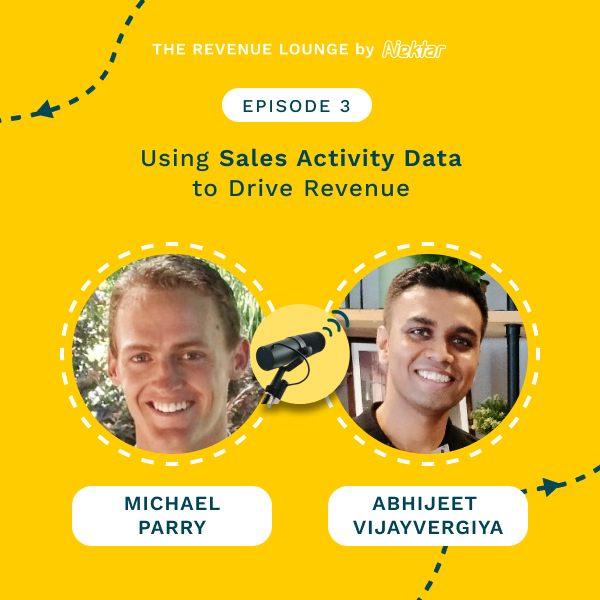
Ep #3: Using Activity Data to Drive Sales Productivity
Listen Now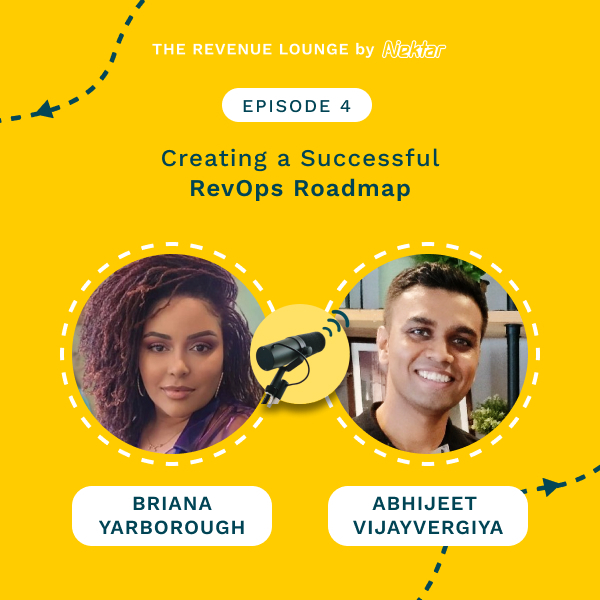
Ep #4: Creating a Successful RevOps Roadmap
Listen Now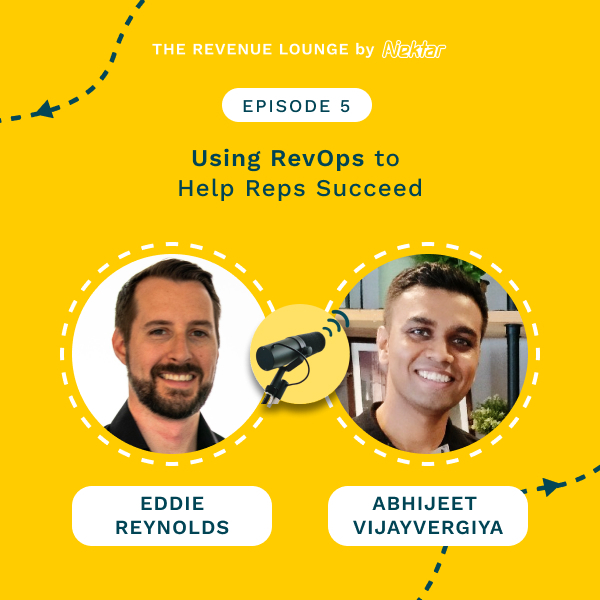
Ep #5: Using RevOps to Help Reps Succeed
Listen Now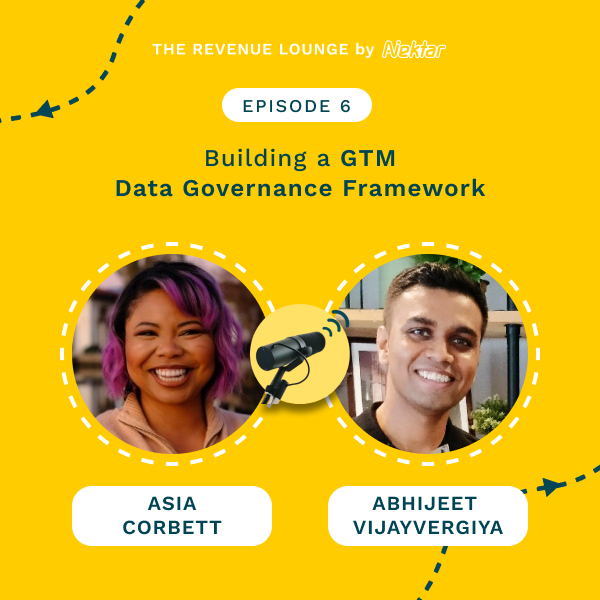
Ep #6: Building a GTM Data Governance Framework
Listen Now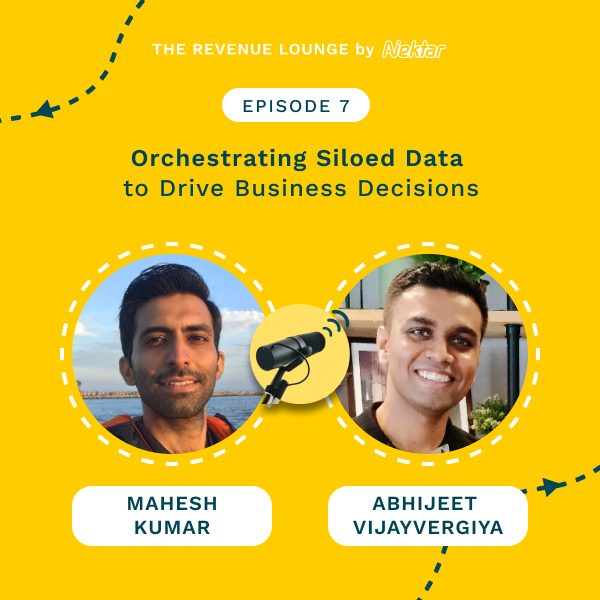
Ep #7: Orchestrating Siloed Data to Drive Business Decisions
Listen Now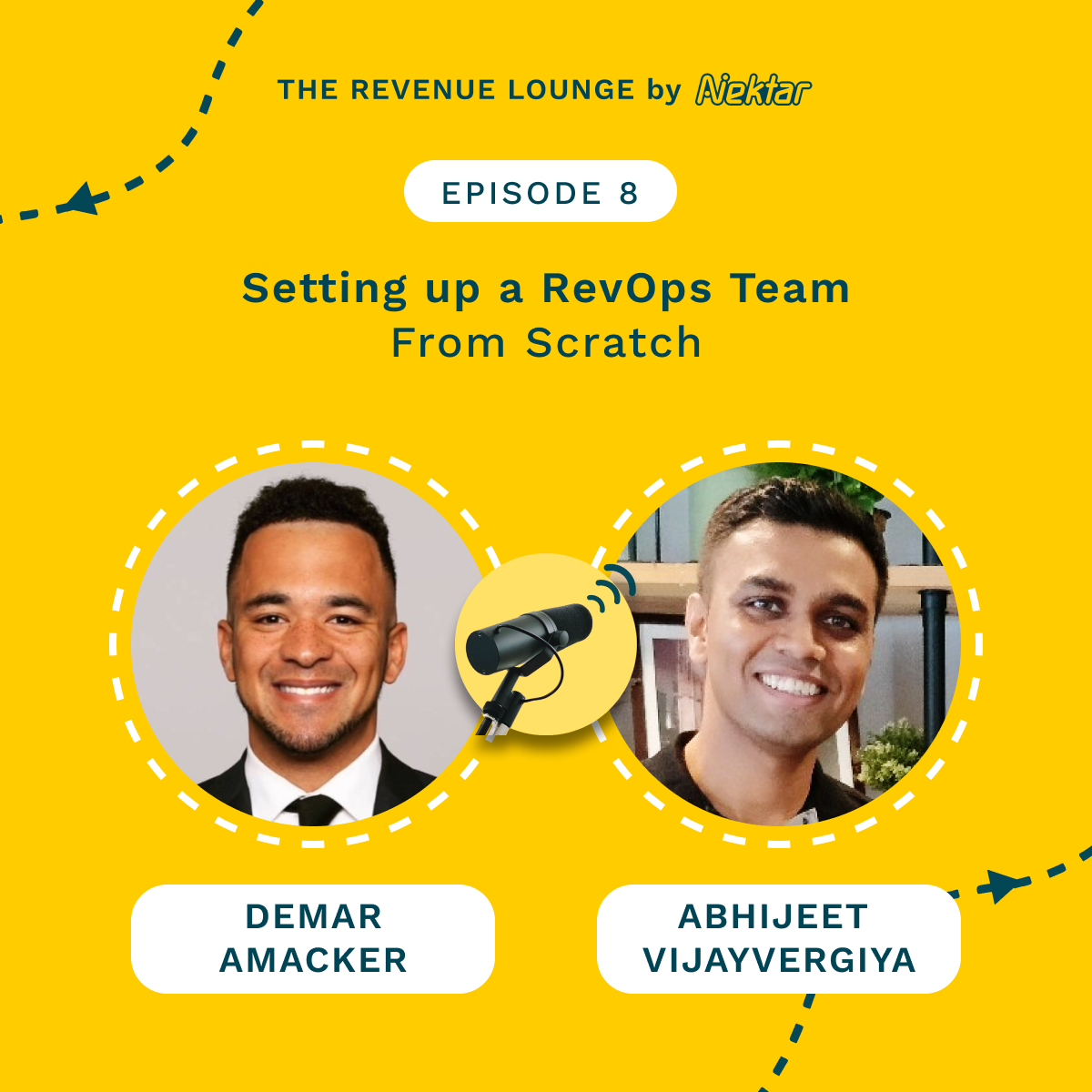
Ep #8: Setting Up a RevOps Team From Scratch
Listen Now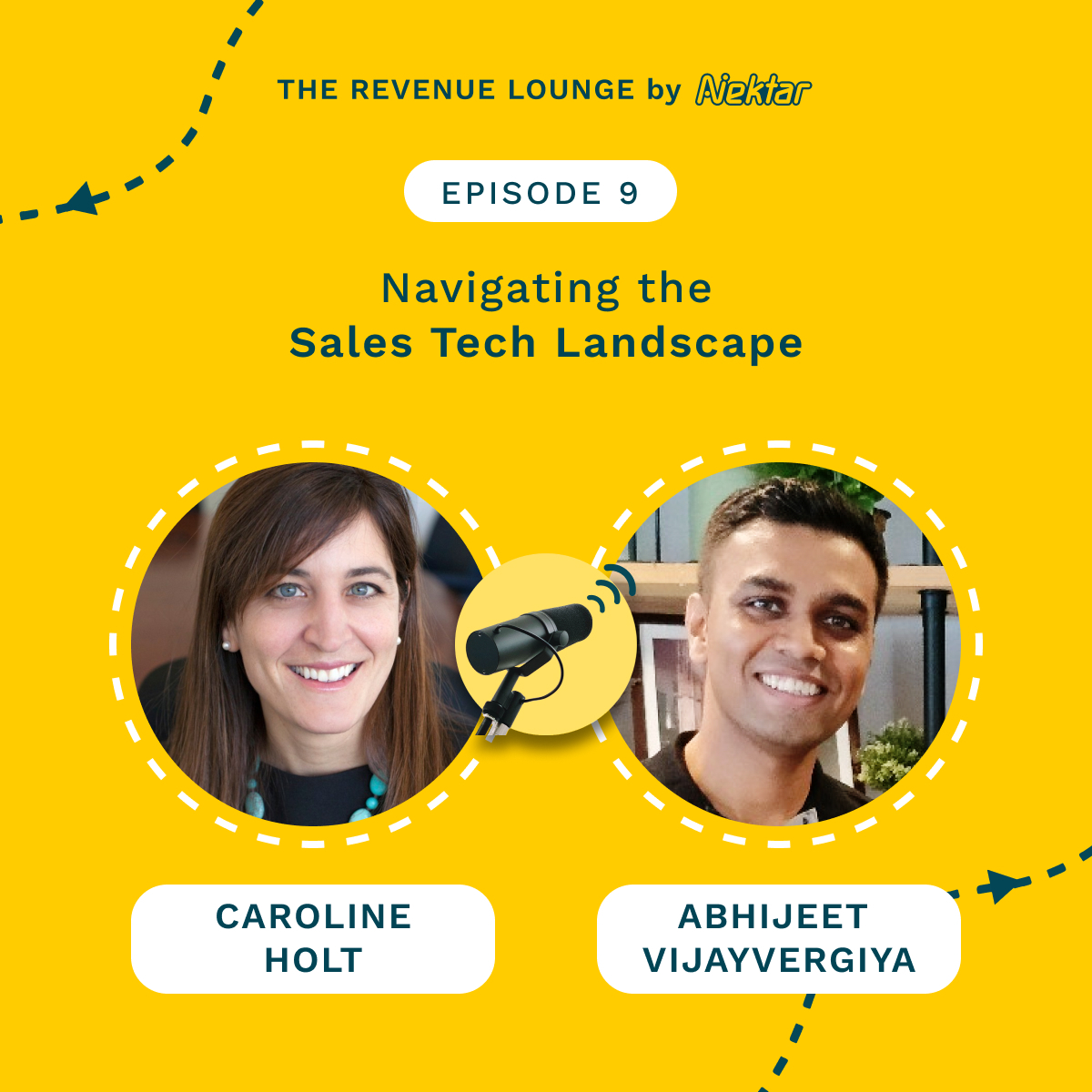
Ep #9: Navigating the Sales Tech Landscape
Listen Now